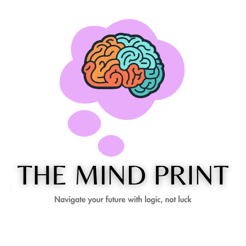Beyond Marks: Choosing Your UG Program for a Fulfilling Career
The aftermath of 10+2 can be a whirlwind of emotions. With college applications looming, the pressure to pick the "right" UG program intensifies. But here's the secret: there's no single "right" path.
Himanshu Sharma
3/21/20242 min read


Beyond Marks: Choosing Your UG/PG Program for a Fulfilling Career
Congratulations on finishing 10+2! It's an exciting time, but also one filled with questions. Choosing an undergraduate program is a crucial decision that will shape your future career path. But how do you navigate this sea of options?
This blog post goes beyond just looking at your marks. We'll delve into two key strategies for selecting the perfect UG program:
1. Dig Deeper: Research Your Interests
Sure, your marks in Physics, Chemistry, and Biology might be stellar, but what truly ignites your curiosity? Look back at your academic journey. Were there specific topics or sub-topics that made you lose track of time while studying? Did a particular project spark your passion and leave you wanting to learn more?
Here's how to unlock your inner researcher:
Revisit old notebooks and assignments: Did you gravitate towards complex problem-solving in Math, or were you captivated by the beauty of language in English?
Recall projects you enjoyed: Did you relish dissecting a frog in Biology or lose yourself in building a model bridge in Physics?
Explore online resources: Research different fields related to your interests. For instance, if you enjoyed the dissection project, delve into fields like Anatomy or Zoology.
2. Researching Institutions: Public vs. Private
Once you have a clearer idea of your interests, research the institutions offering relevant UG programs. Both government and private colleges have their pros and cons:
Government Colleges:
Pros: Typically lower fees, experienced faculty, strong alumni network.
Cons: May have limited infrastructure or resources, competitive admission process.
Private Colleges:
Pros: Often have modern infrastructure and updated curriculum, smaller class sizes.
Cons: Can be expensive, faculty experience may vary.
Researching colleges effectively involves:
Comparing curriculum and specializations: Does the program offer the specific focus you're interested in?
Faculty credentials and research areas: Are there professors whose work aligns with your interests?
Placement records: Does the college have a good track record of placing graduates in your chosen field?
Online reviews and forums: Get a sense of student life and campus culture.
The Power of Career Counseling
While research is crucial, navigating this process alone can be overwhelming. This is where a career counselor comes in. An experienced counselor can:
Administer personality and aptitude tests: These can reveal hidden talents and aptitudes you might not be aware of.
Help you explore diverse career options: They can introduce you to fields you might not have considered.
Guide you through the research process: Counselors can help you identify relevant resources and ask the right questions.
Address your anxieties and concerns: They can provide a safe space to discuss your doubts and fears.
Choosing your UG program is a significant step towards your dream career. By combining introspection, research, and professional guidance, you'll be well on your way to a fulfilling and successful future.
Connect with The Mind Print
himanshu.sharma@themindprint.in
9012335561
The Mind Print
3rd Floor, Sukhshant Complex
Mangal Pandey Nagar, Opp Sales Tax Office
Meerut, U.P 250004

Unsure About Your Career? Mind Print Can Help!
Choosing the right academic path is a crucial decision that can shape your entire career. At The Mind Print, we understand the pressure and confusion students face when selecting a stream and college. That's why we offer expert career counseling sessions to guide you towards a fulfilling future.
Why Choose Mind Print's Career Counselling?
Experienced Professionals: Our team comprises seasoned career counsellors who possess in-depth knowledge of various educational streams, career options, and entrance exams.
Personalized Guidance: We go beyond a generic approach. Our sessions are tailored to your individual strengths, interests, and aspirations.
Data-Driven Insights: We leverage statistics to provide you with a clear picture of competitive exams and college admissions.
The Numbers Speak for Themselves
Highly Competitive Exams:
CUET (Common University Entrance Test): With lakhs of students appearing for a limited number of seats, especially in top universities, strategic preparation holds the key to success.
NEET & IIT JEE (Engineering Entrance Exams): The acceptance rate for these prestigious exams is incredibly low, making expert guidance invaluable.
CAT (MBA Entrance Exam): Cracking this exam requires a focused approach and understanding of your strengths and weaknesses in management skills.
Limited Seats in Reputed Government Colleges: Many government colleges have a limited number of seats, making informed college selection crucial.
Don't Let Statistics Discourage You!
The Mind Print's career counselling empowers you to navigate the complexities of entrance exams and college admissions. We help you:
Identify your strengths and interests
Explore suitable academic streams
Develop a study plan for competitive exams
Choose the right colleges based on your aspirations and entrance exam scores
Take Charge of Your Future
Don't let uncertainty cloud your future. Schedule a career counselling session with Mindprint today! Together, we can create a roadmap to your dream career.
Contact us to learn more!
Additionally, consider including a call to action button that directs students to book a counselling session or explore available resources on your website.
